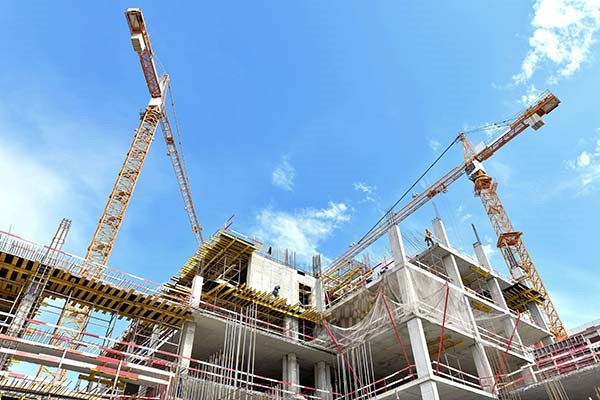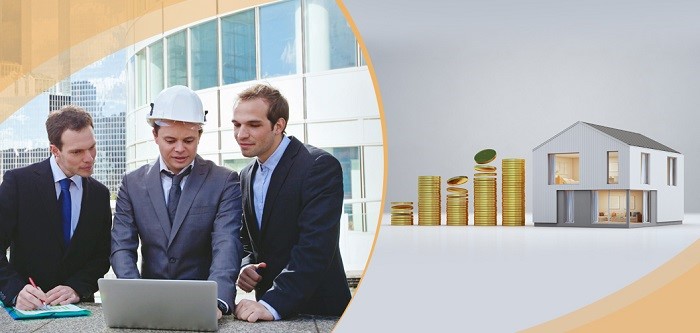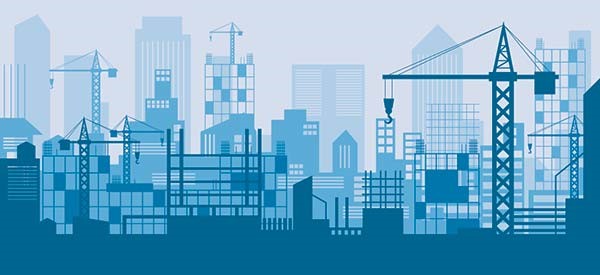In Montreal and Quebec City, condo building projects are well underway!
There are almost new ones coming out every month, and many are starting to wonder how developers are making these projects profitable.
Well, we tried to find the best answer to this increasingly popular question.
Moreover, it is no secret that developers continue to invest heavily in various real estate projects because of high demand and profitability.
Want to find out what are the two methods used to calculate the profitability of a real estate development project?
Keep reading below to find out more!

What is a real estate developer?
First, what is a real estate developer?
A real estate developer is a player in the business world, an investor who aims to acquire land to build buildings it will return by selling or renting.
Basically, he is a real estate investor who develops vacant or poorly optimized land.
Their goals may vary as some real estate developers will specialize only in construction of residential buildings while others prefer the construction of commercial or industrial buildings.
The very purpose of the project may vary, that is to say, that a developer may decide to do a project that will eventually be fully sold or to make one that will be rented in the end.
Rental VS sale, that’s the big debate these days!
The size of a project may also vary. Some real estate developers can focus exclusively on the construction of large towers of 8-storeys or more while some developers will specialize in the development of residential neighborhoods.
The role of a developer is so huge but one thing is certain- what the developers seek more than anything in the world is ideal land for development.

To evaluate the profitability of a real estate development project: Find the right land!
For property developers, real estate is GOLD!
Good land – in a good location, appropriate zoning, and with necessary services – can offer great potential for profit.
Moreover, this is the question that developers ask about each project: what price should I pay for this land if I want it to be profitable?
Indeed, to assess the profitability of a real estate development project, developers must question the price to pay for the land.
Why? Because the rest of the costs are predictable and are not (or somewhat) negotiable. We will tackle that in a few moments.
The price of land, for its part, can be negotiated and varies greatly depending on the perception that the seller has, and the market value. A salesperson may charge too much for a piece of land in the hope of making a big profit which may result in financial losses.
The two challenges that a developer faces every day are:
1. Finding the right land
2. Calculating the right price to pay for the land to remain profitable.
How do developers find and get their hands on the best land in Quebec?
Real estate developers rely on professionals who know the market thoroughly. We are, of course, referring to real estate brokers.
Once ideal land is found, it is necessary to pay attention to what price must be paid at the time of the purchase so that the project is profitable.
Two concepts are also very important when choosing land.

The coefficient of land occupation and zoning: two very important
concepts in real estate development!
When developers are shopping for and prospecting for land, two concepts that play a key role in the process are unquestionably the floor load factor and zoning.
First, zoning is, in fact, the set of municipal and urban planning by-laws that govern the use of the land.
For example, if zoning on your land says you can build a 2-storey house with a maximum height of 9 meters and a maximum length of 30 feet, you will have to comply.
In the case of vacant land in a real estate development perspective, zoning is particularly important because it reveals a second and very important concept, the floor space factor.
It sounds complex but it is actually quite simple.
The floor load factor can be translated as the allowable building density on a lot depending on its area.
For example, if a lot is 10,000 square feet and the zoning allows you to build 30,000 square feet, then you would have a ground factor of 3.
COS = Allowable Building Density / Land Area
The more that a particular land can accommodate a high COS, the more expensive it usually sells. This is normal since it means that you can build a larger number of units or living space and sell more at a lower cost.
But what methods are used to calculate the profitability of a project?
There are usually 2 major methods to calculate the profitability of a project!
In order to assess the profitability of a real estate project, developers must pay attention to the price of land.
To achieve this, they generally use two methods, namely:
✓ The countdown method
✓ The discounted cash flow method
It is important to note that the first method is very simple and allows a gross and approximate calculation of the profitability of a project.
This method best explains the calculation of the profitability of a real estate development project without having to enter into real estate finance.
Thus, we will focus our attention on this method.
We will also explain to you briefly how the second method works, which is more often used by big property developers.
You will see that the countdown method is quite logical and is quite intuitive.

The countdown method
The countdown method is a simplified method that allows you to find the price you should pay for a piece of land based on a very simple formula that takes into account the different construction costs.
The primary goal of the countdown method is to see the financial feasibility of a project on a particular piece of land.
It is a formula that takes into consideration three types of costs. Here is the formula in question:
Fixed costs + variable costs + land price = sale price of the project
Three of the four elements of this formula can be calculated precisely:
Fixed costs: includes all the costs that are necessarily attributable to a project and are calculated in $/sq. ft. For example, in residential construction, we can think about $120 / sq. ft.
Variable costs: includes all other expenses, including the developer’s profit margin, financial expenses, marketing and marketing budget, professional fees, etc. This is usually calculated as 1/3 of the project costs.
The sale price of the project: in the case of a sales project, it is possible to accurately predict the future market value of the units, and therefore, the turnover that the developer will realize.
If you are able to calculate all the costs of the project, as well as the profit that the promoter wants to keep, you can modify the formula to find the price of the land to pay to make the project profitable.
Discounted cash flow method
The selling price of the project
A developer wants to build a 40,000 sq. Ft. Building on a 20,000 sq. Ft. Lot, with a COS of 2.
However, it must be calculated that 20% of the building volume will be lost space due to walls and other common areas. So, the net volume of space for sale is 32,000 sq. ft. (0.8 x 40,000 sq. ft.)
As an example, the developer, during his market research, has targeted that the selling price per square foot for his building is $305.
Project sales would total $9,760,000 ($ 305 /sq. Ft. X 32,000 sq.ft.).
Calculation of fixed construction costs
If we take as an example an average residential building, we can estimate that the fixed cost of construction per square foot would be about $115 / sq. ft.
The fixed construction cost will therefore be $4,600,000 (115 x $ 40,000).
Calculation of variable costs
Many experts generally agree that variable costs normally represent about 30% of project sales. We can, therefore, calculate them from the total sales of the project which we have determined previously.
Regarding variable costs, there is a certain percentage that actually consists of the profit margin that the developer reserves. This margin may vary depending on the developer but is normally still above 8%.
If we calculate 30% of the total sales is $9,760,000, this means that the variable costs would be $2,928,000.
The price to pay for the land
With these 3 figures, it is then easy to find the price to pay for the land.
| Total Projected Sales | $9,760,000 | Total Projected Sales |
| Fixed costs | $4,600,000 | Fixed costs |
| Variable costs | $2,928,000 | Variable costs |
| Price to pay for the land | $2,232,000 | Price to pay for the land |
Thanks to the countdown method, a developer can determine the right price he should pay for land to make his project profitable.
If the land is for sale at a higher price than the target price, the developer will then have to negotiate or agree to reduce his profit margin in the variable cost section.
Although very simplified, this method is very useful.
Developers, however, use much more complex calculators that are based on a formula and a calculation better adapted to the modern financial reality.
This is the discounted cash flow method.
The discounted cash flow method is a method of evaluating the profitability of a project that is much more complex than that of the countdown.
It is however more precise, more effective and generally more relevant for large investors and developers.
What is the biggest difference from the discounted cash flow method?
It takes into consideration the value of money in time.
Indeed, when taking a finance course, the first lesson we teach is that money has a different value over time, and it is on this very important concept that this method is based.
The discounted cash flow method essentially consists of discounting (discounted to today’s value) all of the project’s future sales expenditures and revenues in order to determine the present value of the project as well as the price to be paid for the project for the proposed land.
This type of calculation is perfectly suitable for projects that will ultimately result in rentals but also applies wonderfully to sales projects.
To understand this method, you must have taken a finance course.
This method of evaluating the profitability of a real estate development project offers the following advantages:
● Consider the value of money over time
● Take inflation into account
● Highest level of accuracy
● More realistic
● Ability to quickly consider various scenarios
● More credible for lenders
● Lower margin of error
If you would like to learn how to use this method and many other tools to develop your skills as a real estate investor, we recommend the following two institutions:
Urban and Real Estate Management, Laval University
Certificate in Financial Engineering Multilocation, MREX

Do you want to invest in real estate too? Fill out our form to be accompanied by a professional broker!
Do you want to follow the footsteps of big-time developers who have gotten rich through real estate investments?
That’s a great idea, and if like many you do not know where to start and what to do you would consult a real estate broker who specializes in real estate investments.
He can help you find the ideal project or the most profitable income properties, free of charge!
To find the best real estate brokers in your area, all you need to do is fill out our 100% free and no obligation form.
Yes, everything is free! You fill out our form, you find your broker then he helps you to make an excellent investment.
In the end, you will become wealthier without having spent huge sums of money on consultants!
Fill out our form now if you want to be like the big real estate developers of Quebec and invest in real estate to become wealthy!







